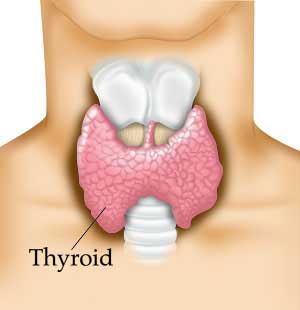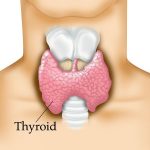
The misunderstood Underactive Thyroid
27 Sep 2016, by in Health Information Hypothyroidism has gone up in the last 50 years. It happens so much that it is quite often not deemed a disease, but rather something inevitable. Women usually resign themselves to this condition and keep taking thyroid pills for life without even wondering about the cause and the potential cure.
Hypothyroidism has gone up in the last 50 years. It happens so much that it is quite often not deemed a disease, but rather something inevitable. Women usually resign themselves to this condition and keep taking thyroid pills for life without even wondering about the cause and the potential cure.
The Underactive Thyroid: what is it?
Hashimoto’s thyroiditis is the most recurring form of hypothyroidism. In this autoimmune condition, your misguided immune system attacks your very own thyroid gland. The unawareness of the complexity of this problem is rampant in the public at large and misguides it into believing that medication will alter the disease’s outcome.
Conventional doctors not being keen on providing thorough information, patients go on symptomatic medication and remain stuck with the disease for the foreseeable future. Hashimoto means that something in your body is very amiss and it has to be dealt with.
When Do You Know You Have the Deficiency?
Every cell in the body uses thyroid hormones to regulate both metabolism and weight through the control of fat burning to provide both heat and energy.
Lacking thyroidal hormones brings countless symptoms that recognizing is not always an obvious thing for two main reasons: a number of organs and tissues unrelated to one another may be affected, and in the major part of cases, only mere symptoms are present.
Symptoms such as fatigue, accrued sensitivity to cold; sluggishness; constipation; dry, flaky skin; hair dryness or loss; random weight gain; muscle and joint pain and stiffness (often mistaken for fibromyalgia); anxiety; depression; irregular and heavy periods; non-existing libido and LDL cholesterol through the roof.
An always present symptom with an under-active thyroid is fatigue: Wake up tired yet feeling better once movement begins only to have the same tiredness take hold again once rest occurs.
Causes and Risk factors:
- Gender: being a woman (the first period, post-pregnancy, menopause periods, dominance of oestrogen);
- Family history
- Stress and adrenal fatigue;
- Tobacco use;
- Lack of Iodine deficiency caused by bromide and fluoride in the environment;
- Autoimmune disease history;
- Possible immunity triggers: viruses, bacterial parasites, yeast infections, background radiation and pollution, heavy metals, insecticides and most especially beauty products…Leaky guts with various food sensitivities: gluten, milk, nuts, etc along with chronic alcohol intake.
The Underactive Thyroid: Treating It
An underactive thyroid and Hashimoto’s is stress doubled with adrenal fatigue, the dominance of oestrogen via oral contraceptives and toxicity of the environment with compromised detoxification and leaky gut added to the mix.
When one takes all this into consideration, it is obvious that only T4 thyroid drugs prescribed in a normal fashion will not make the problem go away. These patients are in fact convinced that if their bloodwork is normal, then their hypothyroidism is gone. When shown to them that many of their symptoms i.e. body weight, fatigue, muscle pain, etc, remain, it is only then that they grasp this notion. Quite often, merely checking body temperature would be sufficient to see the prevalence of the condition.
The thyroid secretes the less active form of the T4 hormone which needs to be converted into T3, a more active form of the hormone. However, problems begin with the fact that you need to be in perfect health for this to take place. Low iodine, iron, zinc, selenium, vitamins A, B2, 12 and 6 will reduce this transformation. High levels of mercury and aluminium hinder this conversion. Stress-fueled abnormally high cortisol levels, caused by stress, lack of vitamin D, oestrogen dominance (once again due to oral birth control), deficiencies in ferritin and a high antibody count stimulate this change and reverse this T3, which then blocks T3 hormone activity. T4 medication administered to unhealthy patients hinders the active T3 conversion leaving the patient with many symptoms.
Hypothyroidism remains a complex, stubborn condition who’s cause needs to be detected by a broad integrative, lifestyle and dietary altering approach coupled with detoxing, stress and hormone control yet it doesn’t need to be an unending process.



